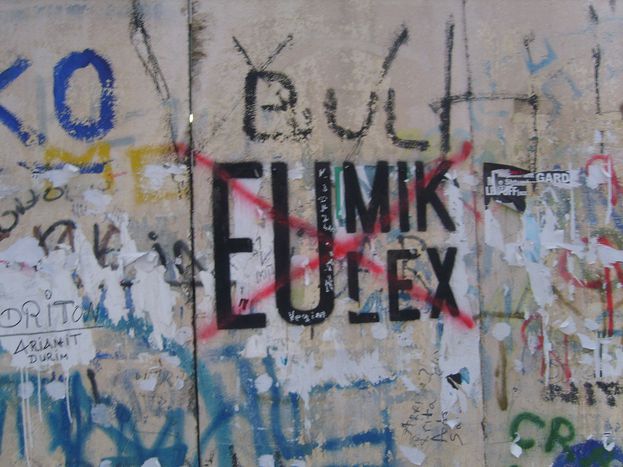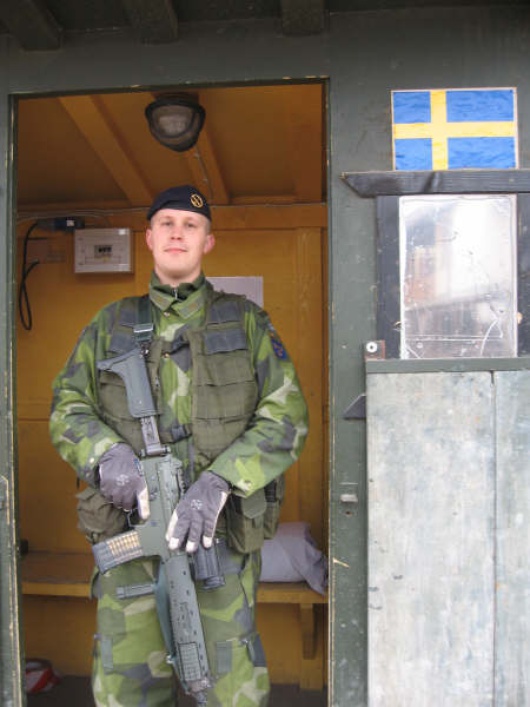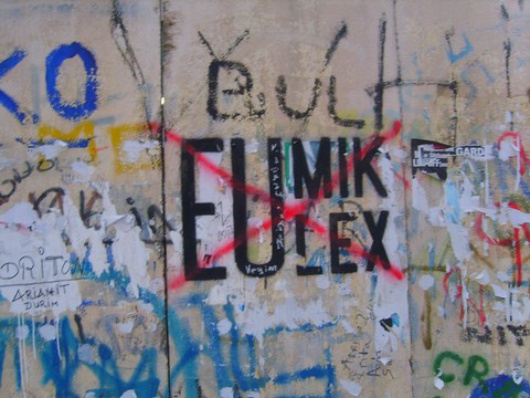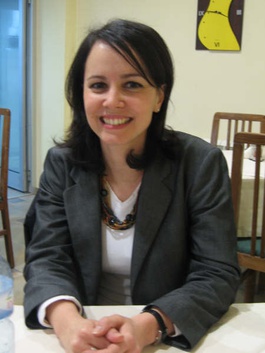
Young Europeans on love, brothels and Beach Boys in Kosovo
Published on
Despite the lack of vegetables and electricity, or precisely because of it, young Swedes, Dutch and French Europeans enjoy working in this remote, recently independent, spot of Europe
Some EU member states have recognised Kosovo’s 17 February unilateral independence, some still will, some will not. Despite political uncertainty, many young Europeans have already headed to the newborn nation, or rebellious province, under the banner of NATO, the OSCE or the new EU mission.
Martin, 25, Sweden
 Old women shuffle past his guardpost on their way to commemorate their husbands killed in the 1999 war. Martin, 25, from Sweden, is guarding an orthodox church in the Serbian enclave of Gracanica. Or Graçanicë, if you happen to be an Albanian Kosovar. To be politically correct, and to simplify things, the KFOR soldiers who serve in Kosovo under NATO have renamed the main roads after animals. If you take a left turn on ‘Dog Road’ you come to ‘Fish Road’. Martin is based in Camp Victoria along with the rest of his Swedish battalion. He has been in Kosovo for five months and will probably stay for two to three more. ‘We mostly stay on base, we don’t really mix with the local population. We train a lot and watch DVDs.’ Contact with locals goes through an interpreter and so is limited to his work activities. Until the expected surge of violence after Kosovo’s declaration of independence, boredom seems to be the biggest threat. Some years ago, Norwegian soldiers stationed in Kosovo filmed a spoof version of the Beach Boys Kokomo.
Old women shuffle past his guardpost on their way to commemorate their husbands killed in the 1999 war. Martin, 25, from Sweden, is guarding an orthodox church in the Serbian enclave of Gracanica. Or Graçanicë, if you happen to be an Albanian Kosovar. To be politically correct, and to simplify things, the KFOR soldiers who serve in Kosovo under NATO have renamed the main roads after animals. If you take a left turn on ‘Dog Road’ you come to ‘Fish Road’. Martin is based in Camp Victoria along with the rest of his Swedish battalion. He has been in Kosovo for five months and will probably stay for two to three more. ‘We mostly stay on base, we don’t really mix with the local population. We train a lot and watch DVDs.’ Contact with locals goes through an interpreter and so is limited to his work activities. Until the expected surge of violence after Kosovo’s declaration of independence, boredom seems to be the biggest threat. Some years ago, Norwegian soldiers stationed in Kosovo filmed a spoof version of the Beach Boys Kokomo.
Kosovo soldiers spoof of Beach Boys Kokomo
It earned them instant stardom on YouTube and a one way ticket back to Norway. Still, locals prefer the soldiers to take part in this kind of entertainment, rather than visiting any of the great number of brothels that have sprung up since the arrival of the internationals.
Huub, 24, Holland
Dutchman Huub, 24, has been a human rights officer for the OSCE for nearly three years in the western town of Pejë/ Pe. He tells a tale which shows that love in Kosovo, also outside the brothels, can always come at a price. Local morals are stricter than in most of Europe, governed by an ancient moral code known as the canons of Prince Lekë Dukagjini. One international in Pejë/ Pe learned as much when he refused to marry a local girl he had gotten pregnant. His car went up in flames and he fled Kosovo.
 Anti-EU mission stencil in Kosovo's divided city of Mitrovica (Photo: morbin/ Flickr)
Anti-EU mission stencil in Kosovo's divided city of Mitrovica (Photo: morbin/ Flickr)
Huub, who has a girlfriend, is not at risk of having any property burned. His work brings him in regular contact with the mostly Albanians locals. ‘You can have very good contacts with locals, it all depends on your own attitude. I regularly meet up with my Albanian Kosovar colleagues and we have been on a road trip to Albania together. But they already have families, so I mostly hang out with other expats.’ Contact with his local peers is even more difficult. ‘I have no contact with young Kosovars my age. Their lifestyle is too different.’
With an income and a position more advanced than even most western European 24-year olds could dream of, this is not difficult to imagine. Huub coordinates two teams and as an international does not pay taxes over his earnings. He misses simple things, like vegetables, running water and electricity. ‘The first night I moved into my apartment, there was no electricity. I was sitting in the dark thinking, now I am in Kosovo.’
Carole & Emmanuel, 29 and 26, France
French colleagues Carole (29) and Emmanuel (26) work in the commission’s liaison office in Pristina. They have a lot in common, but not their reasons for wanting to come to Kosovo. Emmanuel is interested in the development and impact of Europe’s foreign policy. According to Carole, there is a difference between working for the commission in Brussels or in Kosovo. ‘The level of stress is the same, but here it is more intense because of the direct contact you have with your counterparts in the ministries and the advantage of directly seeing the impact of your work on the ground.’
 Carole works on the implementation of projects in the field of democratic stabilisation – including civil society, which requires constant contact with DG Enlargement in Brussels, as well as other donors in Kosovo. Working in a patriarchal society like Kosovo is not an obstacle for her. ‘As a woman I had more problems working in Bosnia. Locals there would sometimes only talk to the man in the team. Not so in Pristina, which is a capital where the people are more used to working with women, especially internationals.’ Emmanuel has just recently come to Kosovo and still has what he calls a very ‘idealistic view of what the European diplomatic service can be.’ Kosovo, he says, is the perfect place for someone who is interested in seeing European foreign policy at work.
Carole works on the implementation of projects in the field of democratic stabilisation – including civil society, which requires constant contact with DG Enlargement in Brussels, as well as other donors in Kosovo. Working in a patriarchal society like Kosovo is not an obstacle for her. ‘As a woman I had more problems working in Bosnia. Locals there would sometimes only talk to the man in the team. Not so in Pristina, which is a capital where the people are more used to working with women, especially internationals.’ Emmanuel has just recently come to Kosovo and still has what he calls a very ‘idealistic view of what the European diplomatic service can be.’ Kosovo, he says, is the perfect place for someone who is interested in seeing European foreign policy at work.
'As a woman I had more problems working in Bosnia'
‘Kosovo is a place of opportunity. And if I pass a competition in the future, Kosovo will definitely help me to get into the future European external action service.’ But Kosovo is not only having an impact on his career. ‘My landlord has told me about his past in the UÇK, the Kosovo Liberation Army. He took me to Prekaz, where the war started. That’s when it becomes personal.’
In-text photos: (PFK), 'EU-MIK' (morbin/ Flickr)



